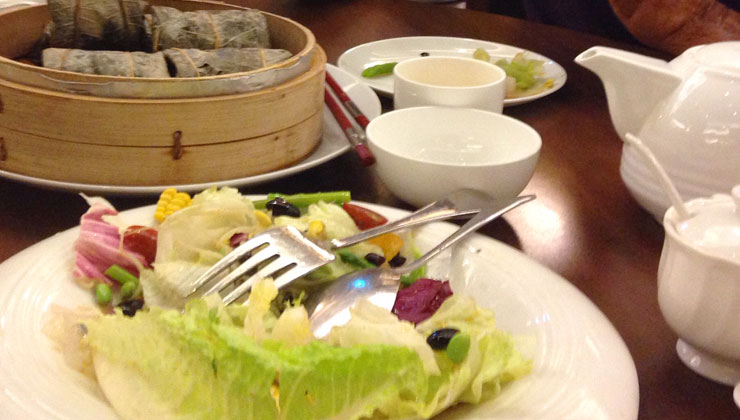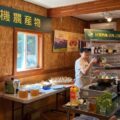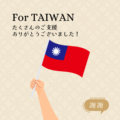- ブログ
「台湾素食」ー台湾式ベジタリアン料理ー
Vegetarian In Taiwan

「台湾素食」ー台湾式ベジタリアン料理ー
「台湾素食」という言葉からは何を思い浮かべますか?もしかしたら”粗食”を思い浮かべるかもしれませんね。しかし、台湾素食とは、肉や魚を使わない料理、つまりベジタリアン料理のことなんです。
What do you picture when someone mentions Taiwanese food? Maybe you imagine richly flavoured meat or fish, but due to their Buddhist heritage there are many delicious vegetarian dishes too.
どれだけ台湾でベジタリアンが一般的かというと、素食専門のレストランやデリなど、素食専門店を表す「卍」のマークのあるお店が、街のいたるところでみられることからもわかります。
You can see how many vegetarians there are in Taiwan by this mark:「卍」. It can be seen at many restaurants and deli’s and shows that the menu is vegetarian.
もともと台湾にはベジタリアンが多く、アジアではインドに次いで二番目にベジタリアンが多いという統計もあります。台湾国内には、6000軒近い素食レストランがあるのだとか。
Statistically, Taiwan has the second highest number of vegetarians in Asia, after India. In Taiwan there are nearly 6000 vegetarian restaurants.
「台湾には、ベジタリアンでなくても ”今日は野菜だけで過ごそう” という “1日ベジタリアン” も多いんです(笑)。日本でも肉料理が続いた日は、そんな風に考える方も多いはず。台湾ではベジタリアンでなくてもちょっと気軽にベジタリアンを実践できる環境があるのです。」
There is also a culture of one-day vegetarians in Taiwan where they try to eat only vegetables for a day. Even if you aren’t a vegetarian you too can enjoy day of vegetarian Taiwanese cuisine.
台湾出身でアリサンのオーナー夫人でもあるフェイは、「台湾のベジタリアン料理の美味しさ、豊富さは世界のトップレベル!!」と言います。
Fay, joint founder and owner of Tengu, is Taiwanese and wants to introduce Taiwan’s top level vegetarian food to Japan.
素食もいろいろ
では、”素食” をもう少し掘り下げていきましょう。素食とは、一般的にベジタリアン料理を指しますが、実は台湾ではもっと細かく定義されています。
There are rules controlling the labeling of vegetarian food in Taiwan, with five different types of ‘vegetarian’.
——————————————————————————
●全素/純素:Vegan & 五葷フリー(五葷とはにんにく、ねぎ、玉ねぎ、らっきょう、にらのことです)
●植物五辛素:Vegan だが五葷は含まれる
●蛋素:卵が含まれている
●奶素:乳製品が含まれる
●蛋奶素:卵、乳製品が含まれる
- Vegan, also with nothing from the allium family.
- Vegan, but may include alliums.
- Vegetarian with egg.
- Vegetarian with milk.
- Vegetarian with milk and egg.
——————————————————————————
素食には仏教の影響が強くあります。日本でも禅宗のお寺の山門には、「不許葷酒入山門(葷酒山門より入るを許さず)」と書かれていることがありますね。これは、精がつき、きつい匂いを放つ”葷”、そして酒は修行の妨げになるという考え方によります。
Vegetarian food in Taiwan is strongly influenced by Buddhism. In Japan you’ll also see many shrines inscribed with kanji forbidding alliums and alcohol.
この影響で、台湾でも日本の精進料理と同じように、見た目は肉料理とほぼかわらない素肉料理が発展してきました。それらは、昆布で出汁がしっかりとられ、グルテン、大豆やしいたけ等で肉に近い味・食感が追求されていることが多いです。いまでも台湾の僧侶は食に関する禁忌を守り、寺院の中のレストランでは戒律に沿った食事が提供されています。もっとも、街で見かける”素食”のお店やレストランは、動物性の食材こそ使用はしていませんが、五葷に関してはおおらかであることが少なくありません。近年は仏教の理由からでなく、地球環境保護、動物愛護、健康志向の高まりから菜食を好む人が増えており、彼らが求める”おいしい菜食” に応えるお店が増えているのです。
Taiwan has developed vegetarian dishes which resemble their meat-based counterparts. In many cases the soup stock is made with konbu, and they use gluten, soy and shiitake for a meat-like texture. Even today Buddhist monks in Taiwan obey strict dietary requirements but regular shops and restaurants, whilst remaining vegetarian, are less strict about the inclusion of alliums. With the global increase in vegetarianism due to protection of the environment, animal welfare and health consciousness, the number of shops selling vegetarian food is increasing.
アリサン・台湾の味シリーズ
アメリカのイメージのあるアリサンですが、実は本格派の台湾素食商品も粒ぞろい。「五色刀削麺」「ケール玄米ビーフン」「豆豉」「味噌チリソース」「台湾沙茶醤(サーチャージャン)」芝麻香椿拌醤
(チーマーチャンチンジャン)麻辣醤(マーラージャン)といった麺類や調味料です。もちろん防腐剤、香料、色素といった添加物は使用していません。ベジ台湾・中華料理を食べたい!と思い立ったらすぐ役に立つアイテムとしてキッチンに常備していただきたい商品です。メーカーは味噌や醤油といった発酵食品に強いベジタリアンのための食品メーカー「ウェイジョン」。ベジタリアン王国・台湾で1945年に創業された老舗です。
We now carry a range of Taiwanese foods, from noodles through to flavoured sauces. All of the noodles and seasonings are free from artificial flavours, colours and preservatives. The seasonings in particular are easy to use and can be used in many different dishes, adding a touch of Taiwan to your cooking. The manufacturer, Weijon, has a store, The Vegetarian Kingdom, which was established in 1945 and specializes in fermented foods such as miso and soy sauce.
Warning: Parameter 2 to wp_hide_post_Public::query_posts_join() expected to be a reference, value given in /var/www/vhosts/alishan-organics.com/httpdocs/wordpress/wp-includes/class-wp-hook.php on line 286




